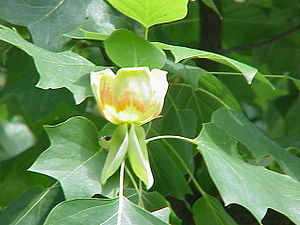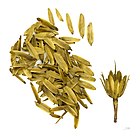Note: This is a project under development. The articles on this wiki are just being initiated and broadly incomplete. You can Help creating new pages.
Difference between revisions of "Liriodendron tulipifera"
(Created page with "{{stub}} ==Uses== {{Uses|}}, {{Uses|}}, {{Uses|}}, {{Uses|}}, {{Uses|}}, {{Uses|}}, {{Uses|}}, {{Uses|}}, {{Uses|}}, {{Uses|}}, {{Uses|}}.<ref name="Uses"/> ==Parts Used== {{...") |
(→Photo Gallery) |
||
| (4 intermediate revisions by the same user not shown) | |||
| Line 1: | Line 1: | ||
| − | + | [[File:Liriodendron tulipifera2.jpg|thumb|right]] | |
| + | '''Liriodendron tulipifera''' is a deciduous tree that can grow up to 30.00 metres tall. It is harvested from the wild for local use as a food, medicine and source of materials. | ||
==Uses== | ==Uses== | ||
| − | {{Uses|}}, {{Uses|}}, {{Uses|}}, {{Uses|}}, {{Uses|}}, {{Uses|}}, {{Uses| | + | {{Uses|Indigestion}}, {{Uses|Dysentery}}, {{Uses|Rheumatism}}, {{Uses|Coughs}}, {{Uses|Fevers}}, {{Uses|Wounds}}, {{Uses|Boils}}.<ref name="Uses"/> |
==Parts Used== | ==Parts Used== | ||
| − | {{Parts Used|}}, {{Parts Used| | + | {{Parts Used|Bark}}, {{Parts Used|Roots}}. |
==Chemical Composition== | ==Chemical Composition== | ||
| − | <ref name="chemical composition"/> | + | Earlier investigations on the chemical constituents of L. tulipifera dealt with several alkaloids andsesquiterpenes [3–11]. These studies have shown the isolated products from the stems of L. tulipifera. L. tulipifera was chosenfor further phytochemical investigation.<ref name="chemical composition"/> |
==Common names== | ==Common names== | ||
| − | {{Common names|sa=|en=|gu=|hi=|kn=|ks=|ml=|mr=|pa=|ta=|te=}} | + | {{Common names|sa=|en=Tulip Tree, American tulip tree|gu=|hi=|kn=|ks=|ml=|mr=|pa=|ta=|te=}} |
==Properties== | ==Properties== | ||
| Line 16: | Line 17: | ||
===Dravya=== | ===Dravya=== | ||
===Rasa=== | ===Rasa=== | ||
| − | |||
===Guna=== | ===Guna=== | ||
| Line 29: | Line 29: | ||
==Habit== | ==Habit== | ||
| − | {{Habit|}} | + | {{Habit|Deciduous tree}} |
==Identification== | ==Identification== | ||
| Line 48: | Line 48: | ||
==Mode of Propagation== | ==Mode of Propagation== | ||
| − | {{Propagation|}} | + | {{Propagation|Seeds}}, {{Propagation|Layering in spring}}. |
==How to plant/cultivate== | ==How to plant/cultivate== | ||
| − | <ref name="How to plant/cultivate"/> | + | Requires a deep rich soil and a sheltered but not overshadowed position. Prefers a slightly acid soil. Succeeds in sun or semi-shade.<ref name="How to plant/cultivate"/> |
==Commonly seen growing in areas== | ==Commonly seen growing in areas== | ||
| − | {{Commonly seen|}}, {{Commonly seen|}}, {{Commonly seen|}}, {{Commonly seen|}}, {{Commonly seen|}}. | + | {{Commonly seen|Deep rich rather moist soils}}, {{Commonly seen|Mountain slopes}}, {{Commonly seen|Rich woodlands}}, {{Commonly seen|Low mountains}}, {{Commonly seen|Bluffs}}. |
==Photo Gallery== | ==Photo Gallery== | ||
<gallery class="left" caption="" widths="140px" heights="140px"> | <gallery class="left" caption="" widths="140px" heights="140px"> | ||
| − | + | File:Ham-sur-Heure AR1aJPG.jpg|(Belgium) | |
| + | File:Liriodendron tulipifera (arbre) - Laeken.JPG|Belgium) | ||
| + | File:Tulpenbaumblatt_unterseite.jpg | ||
| + | File:Tulipier de Virginie (11).JPG|Leaves on the tree | ||
| + | File:Liriodendron tulipifera Blüte im Detail.JPG | ||
| + | File:Liriodendron tulipifera Knospe und Blüte.JPG | ||
| + | File:Liriodendron tulipifera MHNT.BOT.2004.0.jpg | ||
</gallery> | </gallery> | ||
| Line 64: | Line 70: | ||
<references> | <references> | ||
| − | <ref name="chemical composition">[ | + | <ref name="chemical composition">[https://www.researchgate.net/publication/257551578_Chemical_constituents_from_the_stems_of_Liriodendron_tulipifera Chemistry]</ref> |
| − | <ref name="Leaf">[ | + | <ref name="Leaf">[Morphology]</ref> |
| − | <ref name="How to plant/cultivate">[ | + | <ref name="How to plant/cultivate">[http://temperate.theferns.info/plant/Liriodendron+tulipifera Cultivation]</ref> |
<ref name="Uses">Indian Medicinal Plants by C.P.Khare</ref> | <ref name="Uses">Indian Medicinal Plants by C.P.Khare</ref> | ||
</references> | </references> | ||
==External Links== | ==External Links== | ||
| − | * [ ] | + | * [https://plants.ces.ncsu.edu/plants/liriodendron-tulipifera/ Liriodendron tulipifera on plants.ces.ncsu.edu] |
| − | * [ ] | + | * [https://www.missouribotanicalgarden.org/PlantFinder/PlantFinderDetails.aspx?kempercode=a878 Liriodendron tulipifera on missouribotanicalgarden.org] |
| − | * [ ] | + | * [http://www.deepdale-trees.co.uk/trees/2010/07-Liriodendron-tulipifera.html Liriodendron tulipifera on www.deepdale-trees.co.uk] |
[[Category:Herbs]] | [[Category:Herbs]] | ||
| + | [[Category:Pages without herbs images]] | ||
Latest revision as of 11:53, 25 November 2020
Liriodendron tulipifera is a deciduous tree that can grow up to 30.00 metres tall. It is harvested from the wild for local use as a food, medicine and source of materials.
Contents
- 1 Uses
- 2 Parts Used
- 3 Chemical Composition
- 4 Common names
- 5 Properties
- 6 Habit
- 7 Identification
- 8 List of Ayurvedic medicine in which the herb is used
- 9 Where to get the saplings
- 10 Mode of Propagation
- 11 How to plant/cultivate
- 12 Commonly seen growing in areas
- 13 Photo Gallery
- 14 References
- 15 External Links
Uses
Indigestion, Dysentery, Rheumatism, Coughs, Fevers, Wounds, Boils.[1]
Parts Used
Chemical Composition
Earlier investigations on the chemical constituents of L. tulipifera dealt with several alkaloids andsesquiterpenes [3–11]. These studies have shown the isolated products from the stems of L. tulipifera. L. tulipifera was chosenfor further phytochemical investigation.[2]
Common names
| Language | Common name |
|---|---|
| Kannada | |
| Hindi | |
| Malayalam | |
| Tamil | |
| Telugu | |
| Marathi | |
| Gujarathi | |
| Punjabi | |
| Kashmiri | |
| Sanskrit | |
| English | Tulip Tree, American tulip tree |
Properties
Reference: Dravya - Substance, Rasa - Taste, Guna - Qualities, Veerya - Potency, Vipaka - Post-digesion effect, Karma - Pharmacological activity, Prabhava - Therepeutics.
Dravya
Rasa
Guna
Veerya
Vipaka
Karma
Prabhava
Habit
Identification
Leaf
| Kind | Shape | Feature |
|---|---|---|
Flower
| Type | Size | Color and composition | Stamen | More information |
|---|---|---|---|---|
| {{{5}}} |
Fruit
| Type | Size | Mass | Appearance | Seeds | More information |
|---|---|---|---|---|---|
Other features
List of Ayurvedic medicine in which the herb is used
Where to get the saplings
Mode of Propagation
How to plant/cultivate
Requires a deep rich soil and a sheltered but not overshadowed position. Prefers a slightly acid soil. Succeeds in sun or semi-shade.[4]
Commonly seen growing in areas
Deep rich rather moist soils, Mountain slopes, Rich woodlands, Low mountains, Bluffs.
Photo Gallery
References
External Links
- Ayurvedic Herbs known to be helpful to treat Indigestion
- Ayurvedic Herbs known to be helpful to treat Dysentery
- Ayurvedic Herbs known to be helpful to treat Rheumatism
- Ayurvedic Herbs known to be helpful to treat Coughs
- Ayurvedic Herbs known to be helpful to treat Fevers
- Ayurvedic Herbs known to be helpful to treat Wounds
- Ayurvedic Herbs known to be helpful to treat Boils
- Herbs with Bark used in medicine
- Herbs with Roots used in medicine
- Herbs with common name in English
- Habit - Deciduous tree
- Index of Plants which can be propagated by Seeds
- Index of Plants which can be propagated by Layering in spring
- Herbs that are commonly seen in the region of Deep rich rather moist soils
- Herbs that are commonly seen in the region of Mountain slopes
- Herbs that are commonly seen in the region of Rich woodlands
- Herbs that are commonly seen in the region of Low mountains
- Herbs that are commonly seen in the region of Bluffs
- Herbs
- Pages without herbs images







